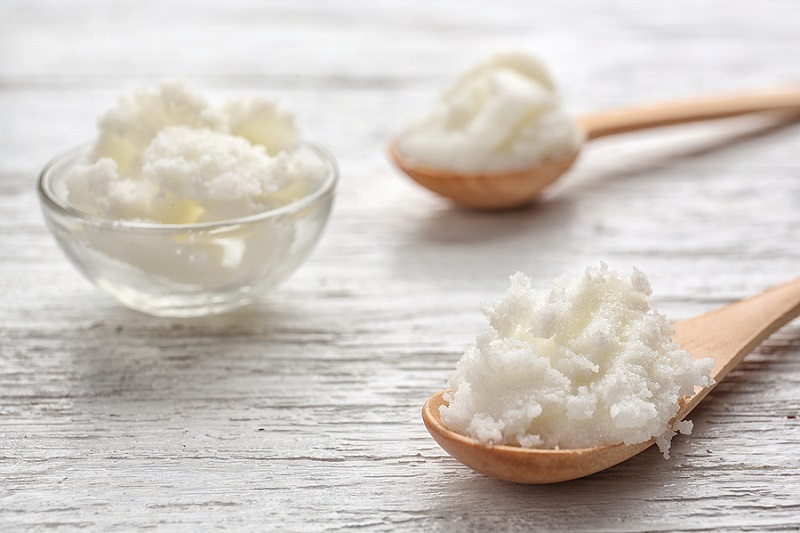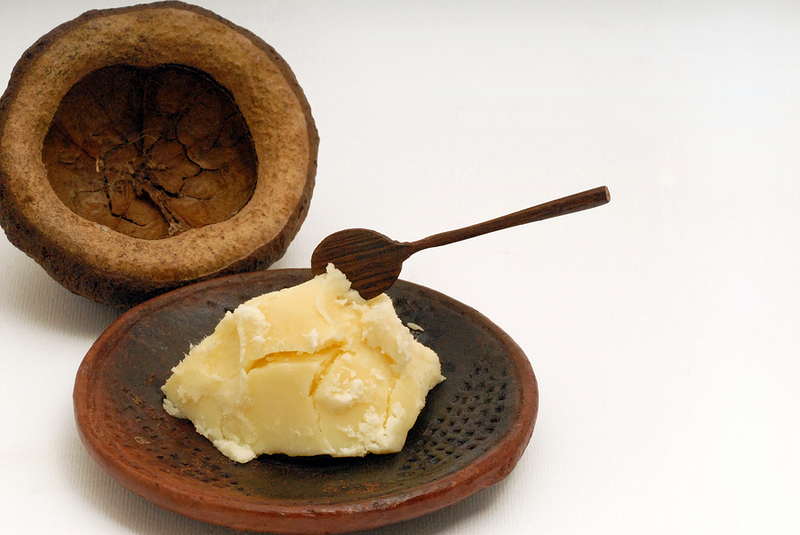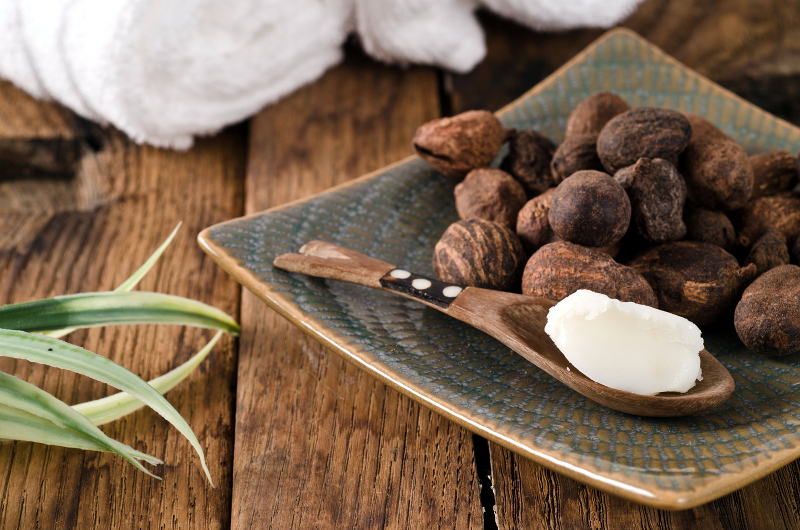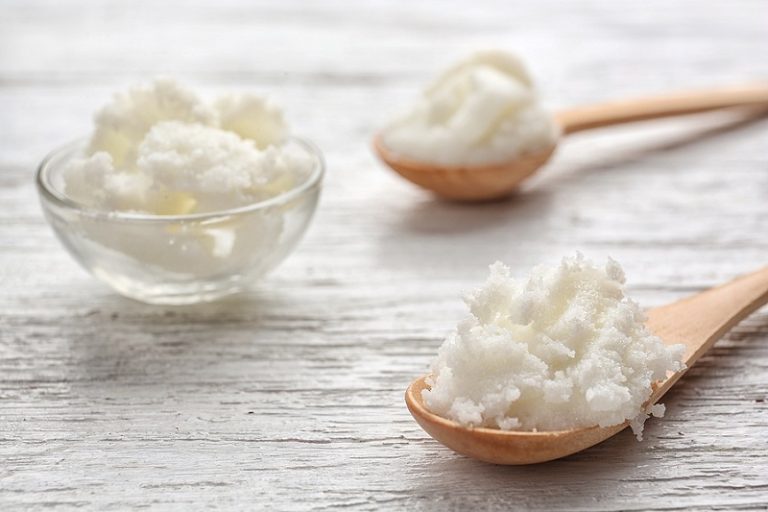Shea butter is a common ingredient found in many beauty and cosmetic products. It is wonderfully moisturizing, providing your skin and hair with much needed nutrients.
But have you ever thought about cooking with shea butter? People cook with castor oil, almond oil, olive oil, coconut oil… surely you could cook with shea butter as well?
Yes, you can cook with shea butter, as long as you find the right kind. There are some shea butters that should be used in cosmetics only and should never be ingested.
So, yes, you can cook with shea butter, but is shea butter healthy to eat?
Below, I cover whether shea butter is edible and whether it can cause allergies, the benefits of eating shea butter, what it tastes like and how to use it in cooking.
What Is Shea Butter?
Shea butter is a fat that is produced from the shea tree which is found in parts of east and west Africa. The fat is extracted from the seed of the plant which contains the oil. Inside the seed, you will find two kernels filled with the nutritious shea oil.
To extract the oil, the kernels are ground into a fine powder and then boiled in water. The resulting shea butter will float to the top of the water where it can be removed.

There are two different kinds of shea butter: refined and unrefined shea butter.
Refined shea butter is produced using heat and chemicals. It is generally preferred by cosmetic manufacturers because it is white and odorless, making it the perfect ingredient in beauty products. However, the production process also removes the majority of the nutrients found in shea butter.
Unrefined shea butter, on the other hand, is produced much more naturally so that the product retains all of its vitamins and nutrients. This product is slightly off-white in coloration and has an earthy scent.
Shea butter is most commonly used to treat the skin and hair. It is incredibly nutritious and can moisturize the skin and hair, allowing you to look and feel healthier. Shea butter has many similar properties to products like castor oil and coconut oil. They too are great for use on the skin and hair.
Many people also use products like castor and coconut oil in their cooking because it can help them from the inside out. You might be wondering then, if you can use shea butter for eating. Is the shea nut edible?
Is Shea Butter Edible?

Have you ever wondered, can you eat shea butter?
Grade A unrefined shea butter is safe to eat and is used by many people as a type of cooking oil because it is very heat tolerant. Many people use a bit of shea butter in their cooking because it adds vitamins and nutrients to your meals.
Besides its nutritional value, shea butter also adds a nice nutty flavor to your meals without having to add whole nuts.
In fact, 80% of all shea butter produced is used in the chocolate industry as a substitute for cocoa butter.
Is All Shea Butter Edible?
You might have gotten different answers from different sources. If anyone ever tells you that you can eat any kind of shea butter, you shouldn’t believe them. You should never eat refined shea butter because it is made specifically for cosmetics and is not safe or healthy for you to eat. However, unrefined shea butter is great for cooking.
Refined shea butter is created in a way that strips most of the nutrients and vitamins from the oil. This is one reason you wouldn’t want to use it for your cooking — there wouldn’t be any benefit to including it in your meal.
Besides it being devoid of nutrients, refined shea butter is not safe to eat because it is usually processed using chemicals.
However, not all kinds of unrefined shea butter are safe to eat, either. There are three different “grades” of unrefined shea butter. Only Grade A is considered safe to eat. You should not eat Grade B or C unrefined shea butter as they are only suitable for cosmetic use.
Is It An Allergen?
Food allergies can be a dangerous and often life-threatening problem. If you’re allergic to any foods, of course you would want to take caution about what you’re putting into your body.
Shea butter is considered a product of a tree nut. Tree nut allergies are one of the most common allergies in the world, so it would be safe to assume that people dealing with tree nut allergies should not consume shea butter.
However, although shea butter is a tree nut product, it does not seem to have the properties found in traditional tree nuts. Researchers have found that people do not have an allergic reaction to shea butter the way they do with other tree nuts. They suggest then, that shea butter is not an allergen. Or, at the very least, allergic reactions to shea butter are very rare.
What Are The Benefits Of Eating Shea Butter?

There has been limited research performed on the use of shea butter and the nutrients it holds. Despite this, there is much anecdotal evidence to suggest that shea butter can help you stay healthy.
The benefits of shea butter on your skin and hair is widely accepted. Evidence shows that shea butter is much more beneficial when used topically, but you can also safely eat Grade A unrefined shea butter to add some nutrients to your body.
Monounsaturated Fats
Shea butter is rich in monounsaturated fats which will help you reduce your levels of LDL cholesterol. By lowering your cholesterol, you will also reduce your risk of cardiovascular diseases. So, if you are at risk of heart disease, or already have heart disease, shea butter can lower your cholesterol and help you to stay healthier.
Besides lowering your cholesterol, shea butter is also great at healing your body from the inside out. The monounsaturated fats help to generate new cells as well as heal damaged cells.
Saturated Fats
It’s also important to note that there is almost as much saturated fat in shea butter as there is monounsaturated fat. Unfortunately, saturated fats are very bad for the body. Just as monounsaturated fat reduces your level of cholesterol, saturated fat can raise it.
Therefore, it’s possible for shea butter to help reduce your levels of cholesterol, but it’s also possible that it might raise your levels instead.
The Nutrients
At first glance, shea butter does not seem to have any nutritional benefits when it comes to ingestion. Here is a quick glance at the nutritional value of shea butter:
| Nutrition | Amount |
| Calories | 120g |
| Fat | 14g |
| Sodium | 0mg |
| Carbohydrates | 0mg |
| Fiber | 0mg |
| Sugar | 0mg |
| Protein | 0mg |
However, shea butter doesn’t contain many bad things, either. While there is no beneficial fiber or protein, it also doesn’t contain any sodium, carbohydrates, or sugar. The main thing you need to worry about is saturated fats.
When you dive deeper into the properties of shea butter, you will begin to notice the nutrients. There are many micronutrients found within shea butter including vitamin E which can boost your gut health, the health of your blood, as well as the health of your brain and skin.
One of the most beneficial aspects of shea butter is that it contains anti-inflammatory properties. Now, we know that slathering shea butter on your skin can reduce inflammation produced from irritation. However, it can also reduce inflammation inside the body, potentially preventing things like arthritis, asthma, Parkinson’s disease, heart disease, and Crohn’s disease.
What Does Shea Butter Taste Like?
There is not a clear answer on what shea butter really tastes like. Unrefined shea butter has a strong, earthy scent to it, which stands to reason that it would have a similar taste. Still, there are many people who claim that shea butter doesn’t have much of a taste at all.
However, others who have tasted shea butter say that it tastes like eggs. This is not an unpleasant taste, generally, especially if you’re using it to cook with. It will simply add a light egg flavor to your dish.
I don’t recommend eating shea butter alone if you’re a picky eater because the taste can be overwhelmingly strong. Some people have reported the oil to taste like a combination of cod liver oil and flaxseed oil. However, most people say it has an earthy and nutty taste that makes it the perfect substitute for butter and jams.
How To Use Shea Butter For Cooking

There are several different ways in which you can use edible shea butter in your cooking. It is a versatile product and has a lot of great uses.
Frying
Shea butter is a great option for frying foods. Grade A unrefined shea butter is 100% natural as well as vegan. It is also very nutritious, so it can be used as a healthy substitute to many other cooking oils or lards.
To use it, you should heat your shea butter to medium-heat before frying your chosen food.
Use It As A Butter
Shea butter is referred to as a “butter” for a reason. It’s very thick and creamy at room temperature, so you won’t have any trouble spreading it like butter. Because of this, you can simply keep your shea butter at room temperature and use it as-is.
Many people use it as a substitute for regular butter, nutella, or jam because it tends to be healthier. Others like it because it is a nice vegan option. Just spread it on your bagel or slice of toast.
Use As A Sauce
Many people use oils like olive oil or butter as a type of sauce spread over their noodles. For a slightly healthier option, or for a different taste, you can substitute shea butter.
All you need to do is heat up the shea butter so that it melts to its liquid form. Then, you can pour the shea butter over the noodles like you would olive oil.
Conclusion
Shea butter is one of the most popular ingredients used in cosmetics and beauty products today. You can find it in all kinds of things from moisturizers, to hair masks, to make-up.
But shea butter is even more incredible than that because it can sometimes be used to cook with as well. Although shea butter seems unhealthy on the surface, it has many hidden nutrients and vitamins that can really protect you from the inside out.
If you decide to cook with shea butter, just be sure that you are purchasing the right product. You should never cook with refined shea butter because it can be filled with chemicals and devoid of nutrients. Be careful of which unrefined shea butter you choose as well. Always choose Grade A unrefined shea butter as Grade B and C are not suitable for consumption.
Know exactly how shea butter is made here, how you can properly store it here or check out more shea butter guides and uses here.



Comments are closed.